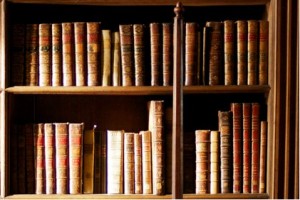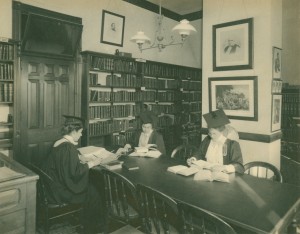 As we welcome the new class of Bryn Mawr College students and greet the many established Mawrters we have already met, I began to ponder an aspect of our research that might be relevant to all those who have recently completed the admissions process…. examinations!
As we welcome the new class of Bryn Mawr College students and greet the many established Mawrters we have already met, I began to ponder an aspect of our research that might be relevant to all those who have recently completed the admissions process…. examinations!
As part of our collaboration with Temple University students last year (see the blog post by Lisa MacMurray on her time as part of the National History Day Cultural Collaboration project) we examined entrance examinations from the past at Bryn Mawr College and the other Seven Sisters. Lisa and her colleague Sam Perry also sourced some examinations from Ivy League colleges in an attempt to compare the different types of exams across the male and female colleges at the end of the nineteenth century. What we found amazed us: most of us would never be able to get into these colleges if those exams were used today! Why so? Knowledge (with a capital ‘K’), or what is deemed sufficient knowledge to obtain and exhibit in order to describe oneself as educated at a higher level, is both culturally and time specific.
Many of the early entrance examinations for the Seven Sisters colleges had an emphasis on religious, bible-based history and candidates were expected to be familiar with the Old and New Testaments. While this may appear odd in today’s more secular educational cultures, it must be remembered that many colleges – both men’s and women’s – were founded on religious principles and were meant to cater specifically for students of particular denominations. Bryn Mawr College and Haverford were, as you will be familiar, founded by Quakers to be places where younger members of the Society of Friends could study within a religious atmosphere accordant to principles consistent with their beliefs.
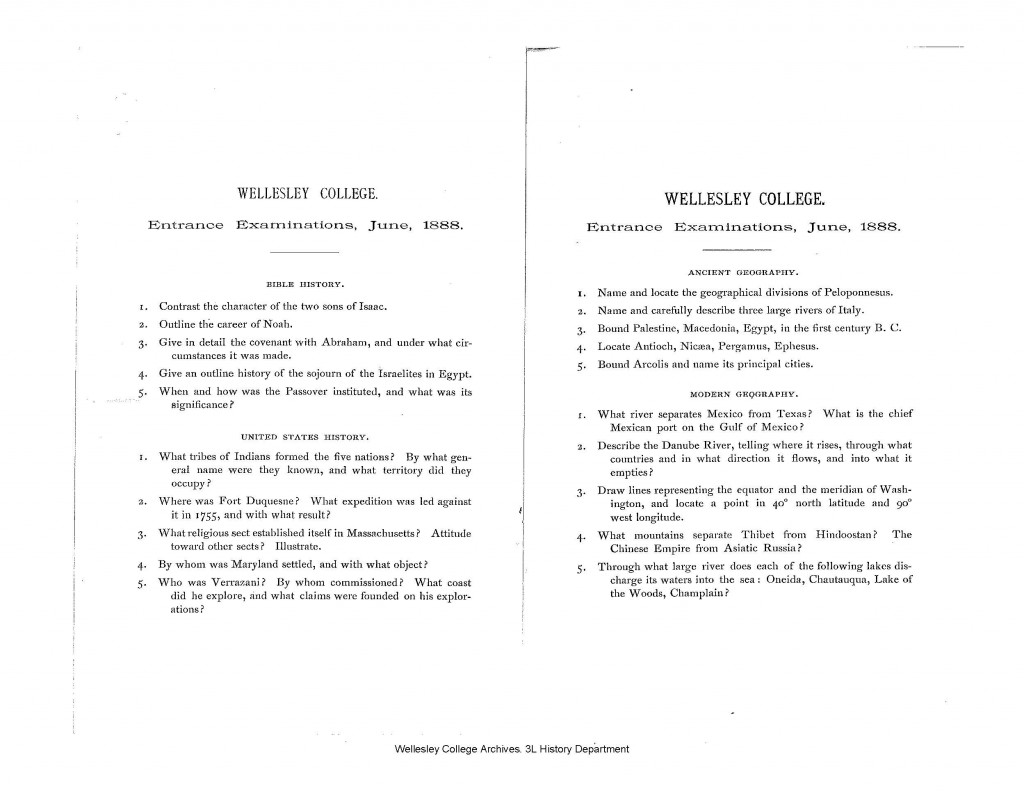
Courtesy of the Wellesley College Archives http://new.wellesley.edu/lts/collections/archives
Others were founded on the same principles, and their examinations demonstrate their expectation that students entering their institutions be familiar with religious histories. Take this extract from the entrance exam for Wellesley College, generously supplied to us by their Archives department (click on the image to view an enlarged version) from June 1888
As you will see, the questions ask the students to analyze and give opinions on episodes from Biblical history, for example: ‘Outline the career of Noah’ or ‘Give in detail the covenant with Abraham and under what circumstances it was made’. I would venture to guess that given the diverse nature of students today and the diminished emphasis in the school system on learning religious histories as part of examinable courses, many students would struggle to answer such questions.

Courtesy of the Barnard College Archives http://barnard.edu/archives
The exam paper on the left is from Columbia College c.1890s and was kindly given to us to display by Barnard College Archives. The topics of ancient geography and ancient history were ones expected by that institution to be familiar to students wishing to enter. Perhaps you specialized in these topics as part of your high school education, but I would certainly have found it difficult to answer ‘Give an account of the legislation of Solon, and the form of government of Athens to the time of Philip I’ (granted, I did my education in Ireland which focused on different kinds of topics for senior high school history, but even still, the nature of these questions seem both specific and difficult).
What about Bryn Mawr College? The first college program (which is available online as part of Bryn Mawr College Archives collection on Internet Archive) specified the entrance requirements as the following: a candidate must be at least sixteen years of age, and give ‘satisfactory testimonials of personal character’. In addition, they would be examined in the following:
- English: spelling, grammar and composition
- Modern geography
- Mathematics
- Latin
- Greek or French or German
- If omitting Greek, candidates had to be examined in one of the following: the elements of physics; the elements of chemistry; the elements of physiology
So this is what you needed to be considered to enter the college …. what about the entrance examinations themselves? Again, Latin and Greek appear as important subjects and exams were conducted for both; in addition, mathematics, English, History, French and German and Natural science.
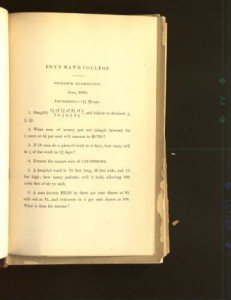
Bryn Mawr College Arithmetic Examination 1890
As you can see from the exam from Bryn Mawr College, students wishing to enter had to display a broad spectrum of knowledge in the examinations, from arithmetic to Greek, English to Geography, a particularly challenging array of subjects given that many girls did not go to formal secondary schools in the nineteenth century but were educated at home, either by tutors, governesses or themselves (or a combination of all three if they were lucky to have the resources). 

Bryn Mawr College Latin Examination 1890
The Latin examination illustrates the importance put on classical languages in the college’s early years, with every entrant expected to have a base knowledge in order to progress in their studies. In this examination candidates were asked to translate selected passages from English into Latin, and others from Latin into English. The difficulty of completing all the requirements is indicated in the fact that an instruction appears at the end that candidates who ‘found the paper too long’ were advised to focus on the first three questions and divide the rest of their time in answering other parts. Are there any readers who would find the task easy? If so, provide us with translations in the comment box below …
Candidates for entrance to the college were also expected to have a knowledge of physical geography and be able to competently describe, for example, the leading physical features of both North and South America as in the example below (as with the other images, click on the exam image to see it appear larger in another window).

Bryn Mawr College Physical Geography Examination 1890
Looking at exams brings us also to analyze the nature of that kind of learning, or what is more commonly referred to as strategic rather than deep learning; in other words, ‘cramming’. This is not a contemporary observation, indeed a writer in the Bryn Mawr Alumnae Quarterly (Vol. VI January, 1913, No. 4, available online here).
“But there are other reasons why students entering the course are unequally prepared. You will say, ‘all the students have to stand the same entrance test.’ This is true, and that brings me to the third cause for the bad composition of our classes. We have evidently not the right test: our entrance examinations are not of the right sort. The students can ‘cram,’ which means they can make a show when really they know very little” (187).
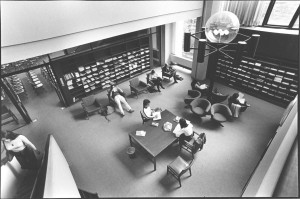 Studying for exams is an essential part of college life, and for many one of its most challenging aspects. Next time, however, you think of how difficult you are finding your test questions to answer, remember that this was an experience shared by students in the past as well as your peers now, and do your best to keep calm and Mawrter on!
Studying for exams is an essential part of college life, and for many one of its most challenging aspects. Next time, however, you think of how difficult you are finding your test questions to answer, remember that this was an experience shared by students in the past as well as your peers now, and do your best to keep calm and Mawrter on!
 Call for Papers: Women’s Studies Area of the Popular Culture Association
Call for Papers: Women’s Studies Area of the Popular Culture Association
